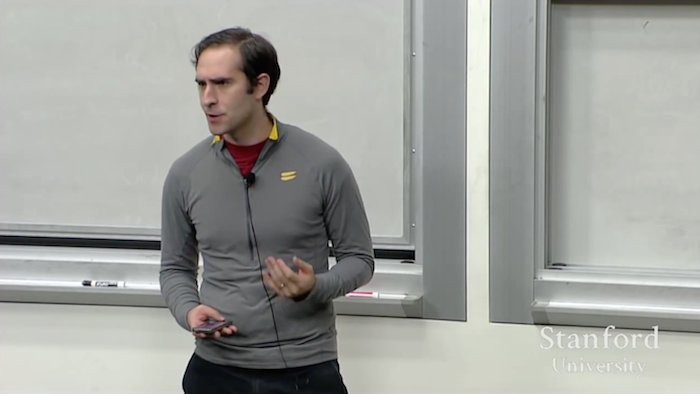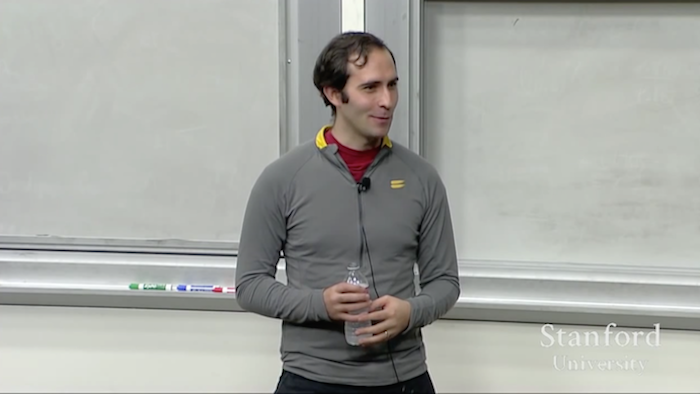Emmett Shire: How to Twitch Talk to Users

Stanford course CS183B: How to start a startup . Started in 2012 under the leadership of Peter Thiel. In the fall of 2014, a new series of lectures by leading entrepreneurs and Y Combinator experts took place:
Second part of the course
First part of the course
- Sam Altman and Dustin Moskovitz: How and why to create a startup?
- Sam Altman: How to form a start-up team and culture?
- Paul Graham: Illogical startup ;
- Adora Cheung: Product and Honesty Curve ;
- Adora Cheung: The rapid growth of a startup ;
- Peter Thiel: Competition - the lot of losers ;
- Peter Thiel: How to build a monopoly?
- Alex Schulz: An introduction to growth hacking [ 1 , 2 , 3 ];
- Kevin Hale: Subtleties in working with user experience [ 1 , 2 ];
- Stanley Tang and Walker Williams: Start small ;
- Justin Kahn: How to work with specialized media?
- Andressen, Conway and Conrad: What an investor needs ;
- Andressen, Conway and Conrad: Seed investment ;
- Andressen, Conway and Conrad: How to work with an investor ;
- Brian Cesky and Alfred Lin: What is the secret of company culture?
- Ben Silberman and the Collison Brothers: Nontrivial aspects of teamwork [ 1 , 2 ];
- Aaron Levy: Developing B2B Products ;
- Reed Hoffman: On Leadership and Managers ;
- Reed Hoffman: On the leaders and their qualities ;
- Keith Rabois: Project Management ;
- Keith Rabua: Startup Development ;
- Ben Horowitz: Dismissal, promotion and reassignment ;
- Ben Horowitz: Career advice, westing and options ;
- Emmett Shire: How to conduct interviews with users;
- Emmett Shire: How to talk to users in Twitch ;
- Hossein Rahman: How hardware products are designed in Jawbone;
- Hossein Rahman: The Design Process at Jawbone.
As part of his lecture for a Stanford startup school, Emmett shared his thoughts on approaches to conducting interviews with users. Then he answers questions from the course participants.
')
Listener 1: What are the typical mistakes made by startups at the stage of interviewing [with users]?
Emmett: The most typical mistake is to show people your product. Should not be doing that. This is the same as telling them about the function. You need to find out what is already in their head, and not to give them new information.
Another mistake is asking questions about the direction for which your favorite function is responsible. If you want to add subscription to your product, you don’t need to go and ask users: “Would you pay for such a subscription? Would you use this feature? ”
Another common mistake is that people do not speak with those with whom they need, but with those who are more accessible. Of course, it's much easier to contact those users who are already members of your forum. You talk to users on the forum of your product, because they are more accessible.
We have been looking for information about people for weeks before talking to them. We could not directly contact them, and spent a lot of time to solve this problem.
Otherwise, we would not get the most accurate data. It flattered almost everyone that we were interested in their opinions, so people willingly shared their thoughts with us. It played into our hands.
Listener 2: Was it difficult to get the approval and consent of the rest of the company's employees? You can say: “If I’m in charge, then you’ll do what I say,” but this is probably not the best option.
Emmett: This is a good question. If you come to the staff and say: “I talked to users. And I found out that we need to create it, ”then it really will not be easy, because people do not trust you [if you do not have proof].
On the other hand, a demonstration interview will act on your colleagues magically. I recommend recording the interview. Then you do not have to take notes, which may slightly interfere with the conversation and not allow to concentrate on the conversation. And then you can show this record to your colleagues.
Listener 3: Since you mentioned the recording, have you tried to conduct an interview via Skype, rather than by e-mail?
Emmett: Of course, you should choose Skype if you can do without email, since emails are non-interactive. The most interesting information follows after the words: “Very interesting. Tell me more about it. ”
As soon as you utter this phrase, the interlocutor will tell you something that you can’t expect to hear. And after that you will need to switch to detective mode: “Hmm, this is interesting. Could you tell me more about this? ”
People do not like silence, so they will continue to speak to fill the pause. The most important advantage of a Skype interview is that they are interactive. You can pull a lot more information out of people. E-mail interviews are usually useless.
Interviewing in person or chatting is easier to record. Just be sure to clarify whether the respondents object to the recording. It is impolite to record without their consent, but if you conduct interviews with users, they themselves may want you to record.

Listener 3: What about the international market? You mentioned that you have many users in Korea.
Emmett: Entering the international market is a very difficult task. To this day, Twitch works much better in English-speaking countries than in the rest. And this is largely due to the fact that we communicate more with people in English-speaking countries and find out what they need. I can not say the same about other countries.
We tried to solve this problem by hiring Korean-speaking people so that they could do translations. We also tried to find “exemplary” users speaking both English and Korean. But the problem is that you will not be able to find such ideal users, no matter how hard you try.
The fact that a person speaks fluent English already means that he cannot be representative of all non-English speakers. This is a difficult task. And therefore, it is easier for companies to expand the market in their own country. In fact, it is very difficult to talk to users from other countries.
Listener 4: What communication channels did you use to reach them? Have you ever paid users for an interview?
Emmett: We contacted them through the message system on the sites. Most websites have the ability to communicate with users. You can contact the user of another website through this message system by writing something like:
"Hello. I’ve watched your channel here ... ”or“ I would like to ask some questions about this site ... Do you mind if I dial you on Skype? ”.
We also figured out where to meet these people. We approached them at various events, many of them attending the same events. We would not conduct interviews there, but we needed to get to know them, exchange business cards and stay in touch.
Usually we do not pay people for the interview. If a person is not sufficiently interested in solving a problem to help you, you probably came to the wrong address. It did not happen to us that people refused to talk for free.
Listener 4: What about the feedback tools on the site?
Emmett: This is a very important question. When it comes to a new product, you need to know whether it will be in demand or not. You can offer people your idea and look at their reaction. This is extremely important.
This way, you will be able to detect the mistakes that you made when creating a product before launching it, which is great. This does not indicate what exactly you need to create, but will help eliminate the shortcomings of your product. Generally speaking, we did not receive feedback in a similar way.
I mean, all this is, of course, good, and in many ways similar to a data-oriented approach. But this way you will find out why people refuse to use your product, instead of trying to figure out which problem you really should solve. What is important for them [users] purely humanly?
This initial stage of the interview with users when starting a startup is crucial. That's what you should pay attention to. We did not conduct the interview in person, mostly by telephone or Skype.
Listener 5: Which of the groups of people who leave different reviews, you need to pay attention first?
Emmett: Given the limited resources we have, we paid more attention to the users of our competitors. We knew that they were already interested in broadcasting and in principle were ready to do it.
It turns out that all we needed was to lure them away, which is much easier than starting from scratch. We chose this approach because we needed quick wins. My game project on Justin.tv simply wouldn’t have a chance without a 25% increase every month. This meant that we needed to get as many people as possible in the shortest possible time. In general, it turned out that this is a good approach.

Listener 6: Previously, the video game industry was decentralized, there was no such connection, cohesion, which is now. You said you originally talked to tape drives. What has changed since then? For example, RIOT Games forbade its regular cybersportsmen to broadcast game passing. Did you try to control it somehow?
Emmett: This question concerns the publishers of computer games, which are important people in this field. No large company will pay attention to you while your startup is in its initial stages. What is both good and bad.
This means that you do not need to talk to publishers, because they are not interested in you. We tried, but none of them agreed to talk with us. But once, when we began to gain popularity in this area, they nevertheless agreed.
I really do not want to speak badly about the publishers of games, because they can be understood. When you are just one small startup among hundreds of other small startups, they don’t have time to talk to each of you. As soon as our company gained momentum, the role of game publishers increased for us.
If I were asked where we get the necessary information, which users Twitch is now interviewing for interviews, I would definitely name computer games publishers among them. They have become much more active in this area, not like three or four years ago. As a rule, we receive the most useful interviews with users from people who are important to us.
Over time, these people take turns. Those who helped you in the first six months will not be your users after three years. It is very important to keep talking to people. Of course, having conducted several interviews with users at the initial stage and having achieved a certain success, it is easier to stop interviewing new people. This is the right way to create not such good and useful features as the ones you created before.
Listener 7: How can the user leave a positive review [on your product]?
Emmett: Leave a positive review? I want users to write what they really think. What are their real problems? To just chat, so to speak.
I just want to tell me about my life. The more you learn about them, as individuals, about their occupation, the easier it is to understand why they want what they want. This is a particularly important issue. For an interview, I need a person who is willing to talk a lot, who will show me the whole picture. On the other hand, if you want to help someone during the interview, just talk. Chat about everything.
Source: https://habr.com/ru/post/263539/
All Articles